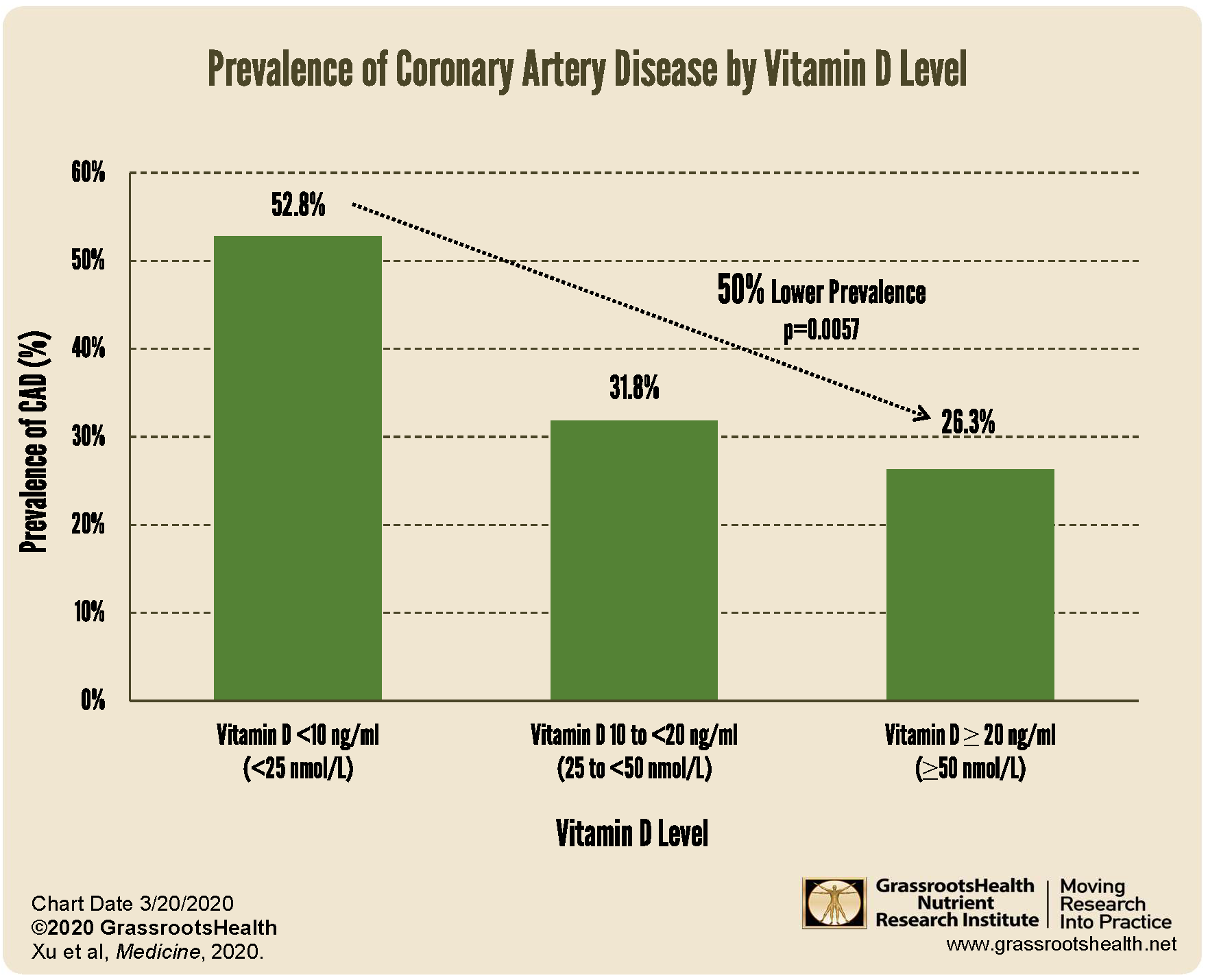Published on March 25, 2020
 Cardiovascular diseases, such as high blood pressure, coronary artery disease (CAD), peripheral arterial disease, and arrhythmias, are considered underlying health conditions that may have an effect on how well the body is able to withstand a pathogenic attack, such as one from a virus. Previously, GrassrootsHealth has covered the correlation between cardiovascular diseases and the status of different nutrients, such as vitamin D, omega-3s, and magnesium. One study in particular looked at the association between vitamin D and peripheral arterial disease (a condition in which narrowed blood vessels reduce blood flow to the limbs) in patients with type 2 diabetes, and found that those with vitamin D levels below 10 ng/ml (25 nmol/L) were about 4 times more likely to suffer from peripheral arterial disease than those with a level of at least 20 ng/ml (50 nmol/L).
Cardiovascular diseases, such as high blood pressure, coronary artery disease (CAD), peripheral arterial disease, and arrhythmias, are considered underlying health conditions that may have an effect on how well the body is able to withstand a pathogenic attack, such as one from a virus. Previously, GrassrootsHealth has covered the correlation between cardiovascular diseases and the status of different nutrients, such as vitamin D, omega-3s, and magnesium. One study in particular looked at the association between vitamin D and peripheral arterial disease (a condition in which narrowed blood vessels reduce blood flow to the limbs) in patients with type 2 diabetes, and found that those with vitamin D levels below 10 ng/ml (25 nmol/L) were about 4 times more likely to suffer from peripheral arterial disease than those with a level of at least 20 ng/ml (50 nmol/L).
Study Confirms Link Between Vitamin D Levels and Coronary Artery Disease (CAD)
A recently published study by Xu et al. analyzed data from 93 postmenopausal women with CAD and 119 control women, all above the age of 50. Vitamin D levels were measured, and defined as adequate (at least 20 ng/ml or 50 nmol/L), insufficient (10 to less than 20 ng/ml), and deficient (less than 10 ng/ml or 25 nmol/L). When comparing the vitamin D level to the prevalence of CAD, the authors found that 52.8% of the patients in the vitamin D deficient group experienced CAD, compared to 31.8% in the insufficient group and 26.3% in the adequate group.
Could a Low Vitamin D Level be Having a Negative Effect on Your Health?
It is important to note that the cutoff of 20 ng/ml for the group defined in this study as having adequate vitamin D levels was still well below the recommendations made by the GrassrootsHealth panel of scientists, who suggest a vitamin D level of 40-60 ng/ml (100-150 nmol/L) for overall health.
What is your vitamin D level?
Make sure you know your vitamin D level, and take steps to keep it within a target of 40-60 ng/ml or 100-150 nmol/L! Through GrassrootsHealth Nutrient Research Institute, you can also test your essential elements magnesium, copper, zinc and selenium, toxins such as lead, mercury and cadmium, as well as your omega-3 levels, inflammation levels and thyroid stimulating hormone (TSH) level. Find out your levels today! Log on to the test selection page (click the link below) to get your tests and see for yourself if your levels can be improved.
Make sure you track your results before and after, about every 6 months!
Click Here to Access the Test Page
How can I track my nutrient intake and levels over time?
To help you track your supplement use and nutrient levels, GrassrootsHealth has created the Personal Health Nutrient Decision System called
For each specific supplement, you can track what days you take it, how much, and many other details. This will help you know your true supplemental intake and what patterns of use work for you to reach and maintain optimum nutrient levels. Check it out today!









